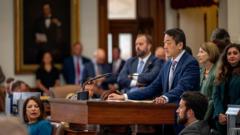WASHINGTON — A crucial bipartisan initiative is underway in Congress, centering on the potential extension of tax credits that significantly reduced health insurance costs for many Americans during the COVID-19 pandemic. However, these credits are at risk of expiring due to a standoff between Democratic and Republican lawmakers over their future.
As the end of the month approaches, Democrats have escalated their threats, stating they will not support measures to avert a government shutdown unless Republicans agree to extend the healthcare subsidies, which originally began in 2021 and are set to lapse at the end of this year. These tax credits are vital for low- and middle-income individuals purchasing insurance under the Affordable Care Act (ACA).
Some Republicans who have traditionally opposed the ACA now express a willingness to maintain these subsidies, citing concern for their constituents who would otherwise see soaring insurance prices. However, many factions within the GOP remain resistant, while their leadership appears noncommittal, suggesting revised conditions for any extension.
Critics warn that if no agreement is reached, millions could receive notices of sharp premium increases, with some estimates suggesting hikes of over 50%. Senate Democratic Leader Chuck Schumer emphasized the urgency, stating that unless Congress acts soon, people will soon get letters exposing them to hundreds or even thousands of dollars in increased premiums.”
As the debate drags on, many stakeholders—including insurers and healthcare providers—are vocalizing concerns about the ramifications of not extending these crucial credits. Blue Cross Blue Shield's David Merritt acknowledged the bipartisan awareness of impending rate spikes, suggesting an opening for legislative action.
As Congress grapples with this issue, they are also contending with larger governmental funding disputes. Democratic leaders, including House leader Hakeem Jeffries, have made it clear that any spending bill must address the healthcare tax credits, leading to added pressure and urgency as negotiations continue.
Senate Republican leaders have hinted at a temporary spending measure while urging for a more detailed proposal from Democrats regarding the tax credits. With midterm elections on the horizon, the evolving political landscape may influence both sides' strategies in the coming weeks, as they strive to balance party ideologies with the interests of millions facing unpredictable health insurance costs.




















